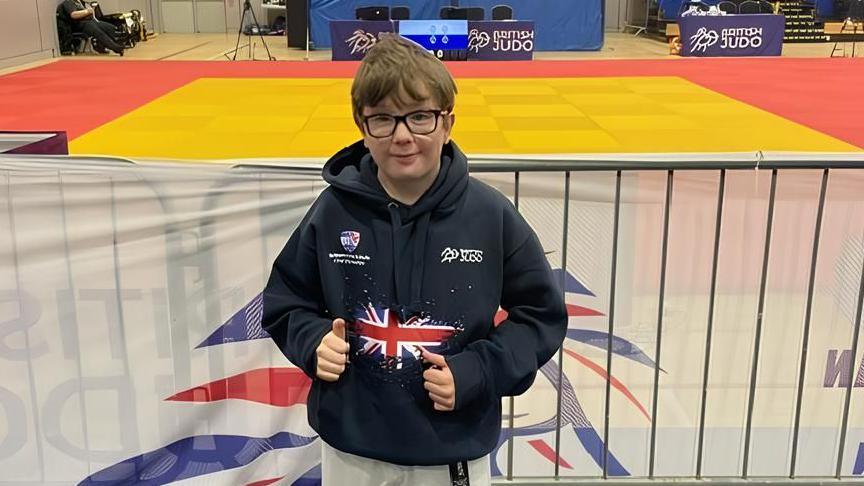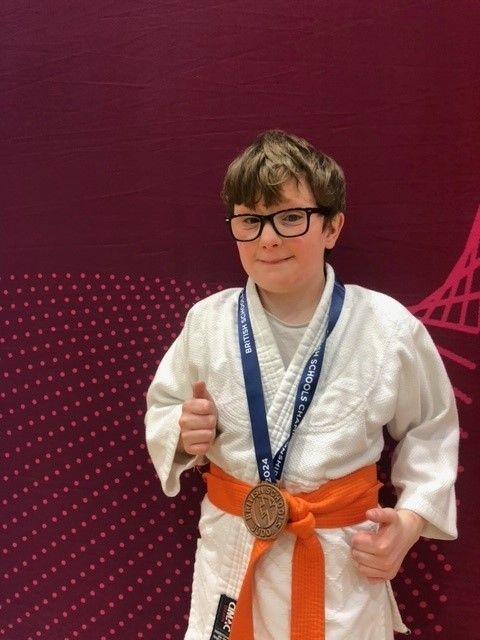'Wobbly eyes' won't stop my judo dreams

Daniel has had nystagmus since he was born
- Published
Since he was born, Daniel Fiddes has suffered from nystagmus, a condition often known as "wobbly eyes".
It means his eyes move rapidly and uncontrollably, leaving his vision permanently impaired.
His condition affects depth perception and focus, making tasks such as reading difficult. Sports involving balls, which need perception of speed and distance, are also a problem.
But when Daniel discovered judo at the age of seven, everything changed.
The 13-year-old, from Hamilton, recently won bronze in a national judo competition for the visually impaired.

Daniel now has two judo medals under his belt
Nystagmus is a sight loss condition that affects 2.4 people per thousand in the UK, according to the Royal College of Ophthalmologists.
Daniel has infantile nystagmus, which develops around three to four months after birth.
Many people with the condition do not describe their vision as blurry but instead complain of strain and difficulty seeing.
In nystagmus, the eyes will be focusing on something and then start to drift away before quickly snapping back.
This eye movement happens very fast, between two to four times a second.
Nystagmus affects different areas of the eye in different people.
For some, the eye movement is worse when looking straight ahead compared to looking side-on.
In the worst positions for the eyes, sufferers feel more strain and tiredness.
Explaining nystagmus
The causes of nystagmus are not very well known, and the condition is still the centre of much research and debate among experts.
Jonathan Erichsen, professor of visual neuroscience at the University of Cardiff, has been researching the condition for most of his career.
He said: "One could write a book about what we don't know about nystagmus."
More than 20 years ago, he founded the Cardiff Research Unit for Nystagmus (RUN) to study eye movement disorders, specifically infantile nystagmus.
He said it is hard to understand how nystagmus affects the sufferer from an outside perspective, as they have no knowledge of normal vision for reference.
Prof Erichsen said: "It's very difficult to get inside someone's perceptual mind in terms of what they see, because that's all they've ever seen."
Even though the eye is moving several times a second, the perception of the world for sufferers is stable.
Everyone's brain interprets what the eyes see and makes sense of the world around them.
Prof Erichsen said: "We all move our eyes a lot, and in the process of moving our eyes, we don't see the world as moving; that's because our brains have a mechanism for that. We think that's in operation in those with nystagmus."
Living with nystagmus
When Daniel was diagnosed with the condition as a baby, his mum, Kathleen Fiddes, wanted to learn as much about it as possible.
She said: "I wanted to understand the implications that would have on his vision and how it would impact him and his life."
To live with nystagmus, Daniel has developed different strategies such as being closer to the board in school and making the text larger if he is reading on his Kindle.
When it comes to sport, judging speeds and distances in ball games is difficult but judo, where the main aim is to hold on to your opponent until they can be thrown or pinned down, is something Daniel found much easier to get to grips with.
"It's just really therapeutic almost, it just feels really natural to me," he said.
Prof Erichsen said he can see why it is a sport that someone with nystagmus would be attracted to.
"If you think about it, you've got the whole body of your opponent to look at; they don't need to see the person in detail," he said.
Daniel said he was really happy to have come third in the British Schools VI Championships, a judo competition for people with a visual impairment.
This is not the first time he has got a podium place at the championships, having come second before.
Daniel said: "I want to keep competing and try to get gold next year."
His mum Kathleen said: "I was super proud of him.
"He had a few really hard fights, and I saw a real improvement in him from the year before. He fought really well in all of his fights.
"He showed a lot of determination to hold his own in the fights and try not to get thrown by anyone else."

TV presenter Richard Osman also suffers from nystagmus
As well as attending sessions at the Hamilton Judo Club, Daniel also volunteers there, helping at the assisted support needs sessions.
The assisted support judo sessions are designed to help children with different disabilities, such as visual impairments and autism.
As Daniel has shown, people with nystagmus can still live life to the full.
Prof Erichsen said: "Nystagmus is something that's more than an annoyance, but it's not necessarily life-limiting. Many with it lead very rewarding lives."
For example, Richard Osman, the TV producer and presenter of Pointless, has nystagmus.
He has previously said he could not see the blackboard at school, is unable to drive and has never been able to see a bird in a tree.
He even has to memorise scripts as he is unable to read an autocue when presenting.
Prof Erichsen said: "I believe that there's a common cause to nystagmus, and if we work it out, we could stop it from progressing in a child.
"Even if we couldn't cure it, we could intervene and make it less pronounced. "
"That's my goal in life."